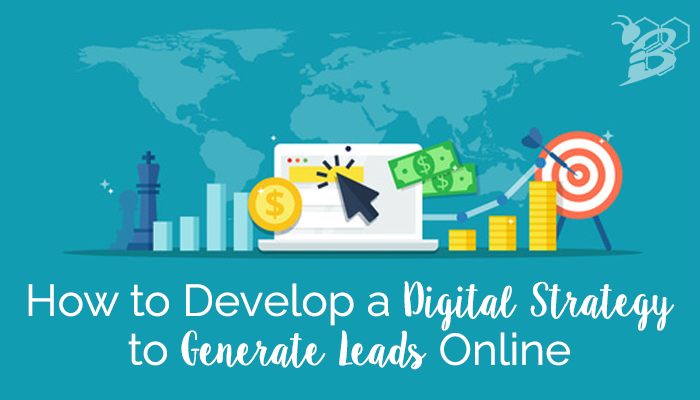The backbone of any good online marketing campaign is a killer digital strategy. Far too many businesses are operating without a solid digital strategy and are essentially throwing mud against the wall hoping something sticks. You'd never go into a business without a business plan, right? Why do the same thing when looking at your marketing?
Here we're going to look into what should be in your digital strategy in order to use it to generate more leads online.
Step 1: Persona Development
If you've read some of our previous blog posts like 5 Reasons Why Buyer Personas are Important for Your Business and The Importance of Creating Buyer Personas, you know that we are firm believers that this has to be your first step in setting up your digital strategy. If you don't know WHO you're talking to, how do you know WHAT to talk about?
Now, this is a step that many businesses kind of gloss over. It's easy to do so because we all have preconceived notions of who our target market is, but in reality, most of us end up being a bit surprised by the end result if done well. Personas aren't as simple as something like - "women 35 or older". That does not give you any insight into who your target persona is, what they're interested in, where to reach them, their struggles, or their goals. If it was as easy as saying, "women 35 or older" you'd be able to post on Pinterest each day and have revenue coming in constantly. The world doesn't really work that way.
In order to really understand who your target personas are, you should use the following information:
- Current & past customer interviews
- Both good customers and poor customers
- Evaluation of best & worst fit customers & industries
- Staff interviews - sales people in particular
- Evaluation of favorite kinds of customers to work with
- Job role or title
- Company goals
- Goals for each persona
- Challenges for each persona
- Who does each persona report to?
If you're still struggling to accurately define each persona (you should probably have at least three personas), try using Make My Persona.
Step 2: Competitive Analysis
You don't have to recreate the wheel. Looking at and understanding what your competition is doing can give you a good starting point and help you understand what is working and what isn't working in your industry. We recommend identifying at least three solid direct competitors that you'd like to research. Your research should start with keyword research, social media research, content audits, and even positioning evaluation.
For keyword research we recommend using one of these softwares:
On social media, you should be looking at content frequency, value, engagement, and style. If you can get an idea of the content that is resonating best, who it's resonating with, and the strategy around their successful and unsuccessful content you can get a better idea of what to do and not to do on social media.
Now, it's likely your competitors aren't performing very well with their onsite content. A majority of businesses fall short in this category, but you should audit their content and understand where each piece of content falls (top, middle, or bottom of the funnel), how it's being marketed, call-to-action style, and landing page set up.
Last, you need to understand how your competitors are positioning themselves as compared to your business. Are they marketing themselves as a premium option, cost efficient option, or somewhere in the middle?
Step 3: Content Analysis
Now, let's do the same kind of content audit that you just did on your competitors, but this time on your own content. Is your content all falling in the bottom of the funnel (which is very common)? Are there holes in your content that should be filled? Are you not utilizing enough calls-to-actions? Are you posting enough on social media? Are all of your content offers too similar? Are specific types of content outperforming others?
We recommend working with a few people on your team and looking at your content from the perspective of your target personas. Be critical and really determine if your content is good enough for someone to engage with, fill out a form for, or to click through on.
Step 4: Content Plan
Many businesses fall into the trap of developing content whenever inspiration hits them or they have some free time. That kind of plan is never going to be successful. Sure you may have a piece of content that you develop this way that ends up being a hit, but as a long-term answer, you're going to be way behind the game.
Your content plan should always be thinking at least three to six months ahead. Don't fall into the trap of holidays, events, and seasons sneaking up on you and then forcing a piece of content out that isn't up to par.
Developing a content calendar including responsibilities of each of your team members, due dates, revision dates, who your content is targeting (target persona), why it matters to them, how it fits into your overall strategy, and how you'll promote it will help you to develop great content that performs well.
Step 5: Execution Plan
Planning on executing your entire digital strategy on your own while running the business? Please, please, PLEASE think again. To be effective online, you are going to need help. Whether it's in the form of an internal team or an agency partner, you need to have a team of professionals with a realistic set of goals, expectations, timelines, and focus to execute properly.
It's nearly impossible for a business owner to focus on their business and try to handle all of their digital marketing at the same time. If marketing is not your background or forté, outsource it or hire help. Effectively outlining everyone's role in executing on your strategy will ensure that nothing falls through the cracks, deadlines are met, and content is developed that will perform well. It's very important that this is outlined upfront in your strategy document rather than developing the strategy and then hoping that it all gets done by someone.
Coming up with an effective strategy is not an easy feat. It's a document that should take into account every single aspect of your business, your goals, how you plan on reaching each goal, and even challenges that could pop up along the way. Need some help in developing the strategy that is going to get you to your 2017 goals? Check out our GrowthPlan and let our team of inbound marketing specialists develop the plan that's perfect for your specific business.










